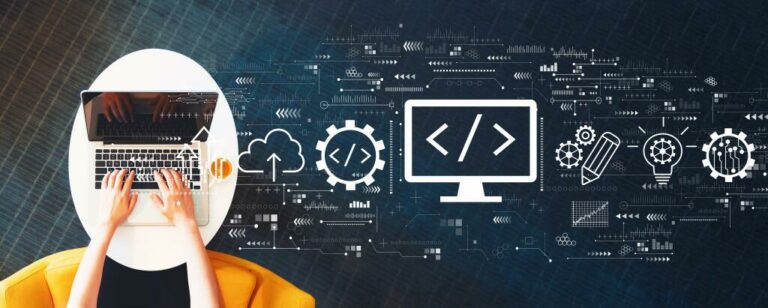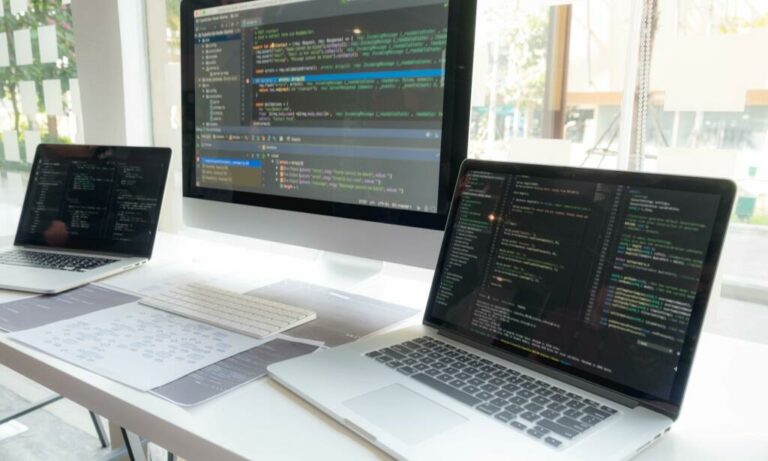Revolutionizing Industry: How Ai Modifications The Sport For Businesses By Somendra Narayan
A chatbot called Mo that serves as a digital research assistant was constructed on the Intelligence Engine and is within the beta testing stage. Covera Health combines collaborative knowledge sharing and applied medical analysis to reduce the variety of misdiagnosed sufferers all through the world. Here are a couple of examples of how synthetic intelligence is streamlining processes and opening up progressive new avenues for the healthcare industry. Its enterprise solution combines this functionality with organizational knowledge to help teams enhance productivity and organizations save on costs.

AI examines past knowledge, shopper preferences, and market developments utilizing machine studying algorithms to estimate demand precisely. This makes it attainable to process orders automatically, optimize inventories, and make dynamic pricing adjustments. Additionally, AI improves fraud detection, reducing the hazards connected to fraudulent orders. For example, Whirlpool utilizes RPA to automate its manufacturing processes, notably on the assembly line and materials dealing with tasks. Repetitive and rule-based duties are carried out by RPA bots, which guarantee accuracy and productivity within the manufacturing course of.
Predictive Ml Fashions For Manufacturing: Use Instances, Advantages, Development And Implementation
While challenges to AI adoption nonetheless exist, empowering manufacturers to do more with less utilizing AI automation is the proper way to speed up digital transformation. AI automation is helping manufacturing companies reduce costs, improve effectivity and clear up new problems. Incomplete, inaccurate, or biased knowledge can lead to flawed AI models and unreliable outputs, doubtlessly inflicting detrimental consequences for companies (Mehrabi et al., 2021). Ensuring information high quality and maintaining a consistent circulate of related data is crucial for the effective deployment of AI solutions.
- Discover how AI can revolutionize manufacturing with these 10 impactful use instances that provide important advantages for business leaders to discover and combine into their operations.
- AI-driven supply chain optimization can identify probably the most environment friendly routes for transportation and distribution, lowering gasoline prices and carbon emissions (Ivanov et al., 2019).
- AI-powered systems can autonomously adjust production parameters, optimize energy consumption, and detect anomalies in actual time, leading to elevated efficiency and decreased prices.
- AI is being used in the actual estate trade to analyze market situations, property prices, and other elements to find out property values, trends, and investment alternatives.
- Furthermore, these wearables can monitor the wearer’s health indicators or environmental circumstances, alerting them to potential hazards like toxic gas publicity or excessive temperatures.
This approach in manufacturing management boosts the bottom line by maximizing output, minimizing waste, and ensuring products meet high quality requirements, enhancing buyer satisfaction and aggressive advantage. Similarly, within the retail business, AI-powered stock administration systems can optimize inventory levels, minimizing overstocking and stockouts, resulting in improved efficiency and value financial savings. AI-driven cybersecurity solutions can proactively detect and respond to these threats in real-time.
How Does Ai Tackle Key Challenges Across Each Step Of The Manufacturing Workflow?
Its media software program features a media administration tool that gleans insights from analyzing existing content material and then delivers suggestions for content creation. The software handles the total lifecycle of journey and expense management, from reporting to reimbursement. Its Ava AI chatbot addresses customer support issues, together with person questions, journey bookings, flight changes, spend knowledge evaluation and figuring out potential areas of optimization.
Volkswagen exemplifies AI utilization, analyzing sensor information through machine learning for predictive maintenance and streamlined operations, elevating their manufacturing effectiveness and quality. The future of manufacturing lies in the integration of AI technologies in sensible factories, which are the cornerstone of Industry four.zero. Smart factories leverage AI to create interconnected techniques that enable real-time knowledge trade, automation, and decision-making. In sensible factories, AI algorithms analyze vast amounts of data collected from sensors, machines, and production methods.
The AI integration in manufacturing guarantees to unleash efficiency, innovation, and competitiveness, reshaping the landscape of contemporary manufacturing. In manufacturing, AI options enhance overall order management effectiveness, expedite decision-making, and guarantee a responsive, customer-centric strategy by automating duties and offering data-driven insights. Collaborative robots, often known as cobots, play a vital function in AI-driven manufacturing by enhancing productiveness by way https://www.globalcloudteam.com/ai-implementation-in-business-is-it-necessary-to-do/ of collaboration with human operators. In success centers, cobots assist in selecting and packing duties, working seamlessly alongside human workers. Their capabilities embody navigating complicated areas and identifying objects, facilitated by AI systems. While most AI traditionally makes use of ‘black box’ models, new approaches to data science present extra transparency into the full AI pipeline.
Wearable Applied Sciences For Workplace Security
This illustrates AI’s function in data-driven decision-making and innovation in product development. Harnessing AI’s power, manufacturing companies are transforming high quality management, guaranteeing heightened accuracy and consistency. AI employs computer vision algorithms, surpassing human capabilities, to scrutinize product photographs or movies. This expertise, exemplified by Foxconn, a leading electronics producer, enhances high quality management.

Lily AI builds expertise intended to optimize the net shopping experience for brands in the fashion, house and sweetness areas. Its AI-powered product attribution solution makes use of picture recognition to assign descriptors to merchandise primarily based on customer-centered language. Those attributes then gasoline product discovery in order that buyers are capable of finding gadgets which are related to them, whether that’s through search engines like google or product suggestion techniques. Advanced sectors like AI are contributing to the rise of the global travel technologies market, which is on monitor to hit $12.5 billion by 2026. In truth, synthetic intelligence is seen as a software that can give travel corporations a competitive benefit, so prospects can anticipate extra frequent interactions with AI during future trips.
Improving productiveness and efficiency in a manufacturing facility is among the most vital benefits of automated decision-making. Artificial intelligence (AI) permits the coaching of machines to carry out repetitive actions extra quickly and accurately than humans. As a end result, factory productivity rises, and human error declines, ultimately boosting efficiency. The deployment of AI in manufacturing raises questions about regulatory compliance and ethical implications. Manufacturers should ensure that AI methods adhere to business standards and legal necessities concerning safety, environmental influence, and labor practices.
Visual Intelligence: Exploring Ai-driven Pc Imaginative And Prescient Options
Supply chain optimization, made attainable by AI, improves inventory control and lowers waste. It can sustain with ever-changing circumstances and necessities because of its capability to repeatedly study and adapt. Additionally, combining AI and blockchain applied sciences offers supply chain security and transparency. Artificial intelligence is revolutionizing warehouse administration in manufacturing, introducing AI-powered options and machine learning to enhance efficiency, accuracy, and cost-effectiveness. An impactful use case includes AI in stock management, using algorithms to investigate historical gross sales information, current inventory ranges, and market trends for exact demand predictions.
By swiftly detecting flaws in electronic components via AI and pc vision, production effectivity and accuracy improve, enabling the production of high-quality items on a big scale. Additionally, AI trends in manufacturing enhance predictive high quality assurance, allowing proactive defect resolution primarily based on historical and real-time sensor knowledge evaluation. In today’s rapidly evolving enterprise landscape, the power to innovate and keep ahead of the competitors is crucial for long-term success. AI allows businesses to develop new merchandise, companies, and business fashions that disrupt conventional industries and create new revenue streams (Davenport & Ronanki, 2018). Similarly, within the manufacturing industry, AI-powered predictive upkeep and quality management methods can enhance product quality and reliability, enhancing a company’s popularity and market position. In the manufacturing sector, AI is taking half in a pivotal role in streamlining processes, bettering high quality management, and optimizing supply chain operations.
AI’s affect within the manufacturing department is profound, starting from predictive maintenance to quality control. Smart sensors and IoT units combined with AI algorithms can predict tools failures earlier than they occur, minimizing downtime and optimizing upkeep schedules. AI-powered machine vision systems ensure stringent quality control by figuring out defects and inconsistencies in real-time, resulting in fewer defects and better product quality.
AI turns meeting strains into data-driven, versatile environments via constant learning and adaptation, finally boosting output, lowering bills, and upholding excessive standards in manufacturing processes. LeewayHertz, a forefront leader in AI consulting and growth, exactly guides the entire generative AI development lifecycle. The course of begins with totally assessing project requirements, and ensuring a deep understanding of stakeholder expectations. Our strategic strategy covers mannequin choice, coaching methodologies, and useful resource allocation, adopted by meticulous design, development, rigorous testing, and continuous optimization. The concluding phases involve seamless integration into the client’s ecosystem, supported by ongoing help to adapt to evolving needs. Our specialized group excels in offering strategic steerage for AI implementation, addressing distinctive challenges, and developing customized solutions that improve operational effectivity.

However, the speedy progress of AI throughout industries means it could be tough to search out folks with the right expertise to fill these roles. Building an AI-powered defect detection system for high quality control involves a number of steps, ranging from knowledge collection and preprocessing to model growth and deployment. By fine-tuning massive language models to the nuances of producing terminology and processes, LeewayHertz enhances the accuracy and relevance of AI-driven communications and analyses. Since they are extremely scalable, these solutions can deal with rising production calls for without sacrificing pace or accuracy.
Recent Machine Studying Articles
AI has the potential to revolutionize customer experiences by offering customized recommendations, tailor-made companies, and intelligent assistants. In the retail and e-commerce sectors, AI-driven advice engines can analyze buyer data, preferences, and behaviour to counsel products and services that are most related to each particular person (Isinkaye et al., 2015). The healthcare business is witnessing a revolution pushed by AI, with functions starting from medical imaging evaluation to drug discovery and customized medication. AI-powered diagnostic instruments can analyze medical photographs, such as X-rays and MRI scans, with greater accuracy and efficiency than human specialists, enabling earlier detection and therapy of diseases (Litjens et al., 2017). LogicGate’s Risk Cloud resolution works to assist businesses operationalize and automate threat compliance. Its SaaS platform goals to assist corporations handle danger, ensure regulatory compliance and streamline related processes.

For instance, sensible glasses can overlay real-time knowledge, safety alerts, or assembly directions directly into the wearer’s field of regard. This not only speeds up the completion of tasks but in addition considerably reduces the probability of accidents by making certain that security protocols are followed extra closely. Furthermore, these wearables can monitor the wearer’s well being indicators or environmental circumstances, alerting them to potential hazards like poisonous gasoline exposure or extreme temperatures. AI plays an important position in analyzing the information collected by these units, offering customized warnings and suggestions to each worker based on their particular scenario and environment. This tailored approach to safety, powered by AI and wearable expertise, marks a major leap forward in defending workers’ well-being while sustaining high productivity levels.
For instance, an automotive parts manufacturer can use ML fashions to forecast demand for spare elements, allowing them to optimize stock ranges and reduce costs. Artificial intelligence transforms business operations by automating duties, analyzing information, and enhancing decision-making. From automating repetitive processes and optimizing provide chains to predicting upkeep needs and providing personalised customer experiences, AI significantly boosts operational efficiency.
X, formerly known as Twitter, has algorithms that direct customers to people to follow, tweets and news primarily based on a user’s individual preferences. The company’s picture cropping tool additionally makes use of AI to find out tips on how to crop images to concentrate on the most fascinating part. Here are some examples of how artificial intelligence is getting used within the travel and transportation industries. Cruise is the primary firm to supply robotaxi providers to the general public in a significant metropolis, using AI to lead the way. The company’s self-driving vehicles acquire a petabyte’s value of knowledge every single day. AI uses this large information set to continually find out about the most effective security measures, driving techniques and most effective routes to offer the rider assurance they’re safe.


